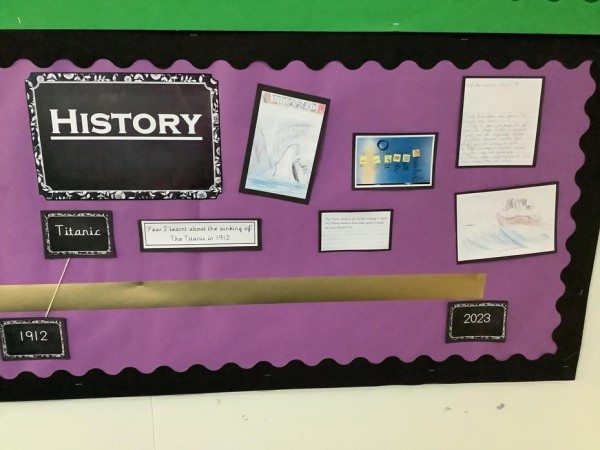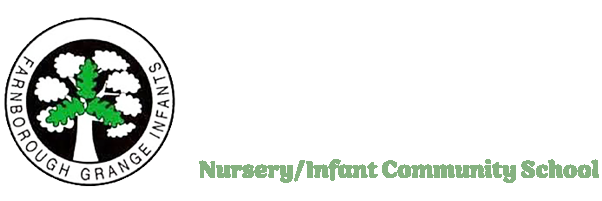History

Intent
At Farnborough Grange Nursery and Infant School, our intent is to provide a vibrant and inclusive History curriculum that engages and inspires our young learners. We believe that History education plays a vital role in developing children’s inquiry skills, fostering a sense of identity and belonging and providing a foundation for historical understanding in later years.
Our overarching aim is to ignite a love of history and cultivate curious learners who understand the significance and relevance of the past in shaping the present and the future.
We have ensured that the curriculum for History contains the correct content and progression through each Key Stage because curriculum overviews were created in reference to the National Curriculum 2014 and expected outcomes are in line with end of year expectations. Our curriculum starts small and dreams big, with our youngest learners exploring their individual history and Year 2 exploring the impact of significant individuals on society. Our curriculum is aspirational and shows children that they belong in the world.
Implementation
The History curriculum is implemented at each stage in the following ways:
EYFS
-
In Nursery, children are taught to identify whether something is old or new and use this to discuss items that relate directly to them, such as their toys.
-
In Reception, children are taught to identify past events in their own lives. In addition, they learn to ask simple questions about people and events from within living memory.
-
Children develop their vocabulary, using subject specific vocabulary such as old and new. In Reception, they also develop an understanding of simple phrases to describe the passing of time.
-
Children can apply their learning through exploring their local environments. Children in the EYFS also participate in whole-school historical events.
Year 1
-
In Year 1 children deepen their understanding of their own history. They also begin to examine significant individuals, such as Queen Elizabeth II and King Charles III, as well as comparing and contrasting their childhood to that of a child living in the Victorian times.
-
Throughout Year 1, children develop their skills in constructing the past by identifying that there are some themes that link history together, such as childhood, toys and schools. They develop skills in chronology by recounting changes that have occurred in their own lives, as well as using simple timelines to sequence events and objects within their own experience. Children in Year 1 build on their understanding of significance and learn to understand what makes someone or something significant. In addition, children learn that an event can be represented in different ways and are taught to extract simple information from a source.
-
We understand the importance of historical language for children’s understanding and effective communication. Topic-specific vocabulary is explicitly taught and modelled, enabling children to express their ideas and engage in discussions about historical concepts.
-
Children have the opportunity to apply their history learning to other subjects, allowing them to make connections across different areas of learning. For example, history is incorporated into English learning through choice of text
Year 2
-
In Year 2, children study the sinking of the Titanic and explore whether the Titanic was a triumph or a tragedy. They also take part in a local study, studying the history of air travel in Farnborough and the impact of Samuel Cody, both locally and internationally. Children then study the life and influence of Florence Nightingale.
-
Children in Year 2 identify that events and individuals from the past have helped to shape the present locally, nationally and internationally. They develop their chronology skills through sequencing more complex stories and through comparing people from different time periods. With regards to historical representation, children understanding that there are different versions of real historical events and understand that people can disagrees about what happened in the past without one person being wrong.
-
Children develop their vocabulary in a progressive manner, building on their prior learning. Topic-specific vocabulary is referenced in each lesson and forms an integral part of class topic displays.
-
Children have the opportunity to apply their history learning to other subjects, allowing them to make connections across different areas of learning. For example, history is incorporated into English through children writing their own newspaper accounts of the sinking of the Titanic. In addition, History is incorporated into Maths through teaching an understanding of time.
Provision for key groups at our school
-
We strive to ensure that all pupils, regardless of their ability or additional needs, have equal access to high-quality history education.
-
Differentiation strategies are employed to support learners who require additional help, and gifted and talented pupils are appropriately challenged.
-
Provision is made for pupils with physical disabilities or sensory impairments to participate fully in all activities.
-
We promote a respectful and supportive learning environment, where pupils value and celebrate each other's contributions.
Wider opportunities
-
All children across the school participate in whole-school historical events, such as Remembrance Day and Bonfire Night.
-
Children are able to participate in school visits with historical links, as well as accessing outreach programmes run by local museums.
-
Significant historical events are marked and celebrated in collective worship.
Impact
The impact of our intent and effective implementation can be observed through the outcomes and experiences of our children. Through regular formative and summative assessments, we track their progress in acquiring historical knowledge and skills. We celebrate achievements and provide constructive feedback to enable further development.
The impact of our history curriculum is evident in the following areas:
Knowledge and Understanding
Our children develop a secure knowledge and understanding of key historical events, concepts, and figures through regular opportunities for retrieval and application. They can discuss and begin to analyse historical sources and begin to make connections between past and present. Our learners also develop a chronological understanding of the past, recognising the sequence of events and how they fit into the wider narrative of history.
Skills Development
Our curriculum promotes the development of critical thinking skills, historical enquiry, and analysis. Children are able to pose historically valid questions, investigate using a range of sources, and evaluate evidence to form reasoned judgments. They gain an understanding of historical artefacts, maps, and images, and can communicate their findings verbally and in writing.
Attitudes and Values
Our curriculum nurtures a deep appreciation for History and encourages children to develop an enthusiasm for lifelong learning. They demonstrate curiosity about the past, show respect for diverse cultures and perspectives, and are encouraged to draw parallels between historical events and contemporary issues.
Our intent, implementation, and impact work together to ensure that children leave Farnborough Grange Nursery and Infant school with a strong historical knowledge base, critical thinking skills and an aspiration to understand more about the world that they belong to. We believe that our engaging curriculum helps children to build the foundations to become respectful world citizens who appreciate the value of history in shaping the present and future.
What do our children learn in History?
History Curriculum Overview
